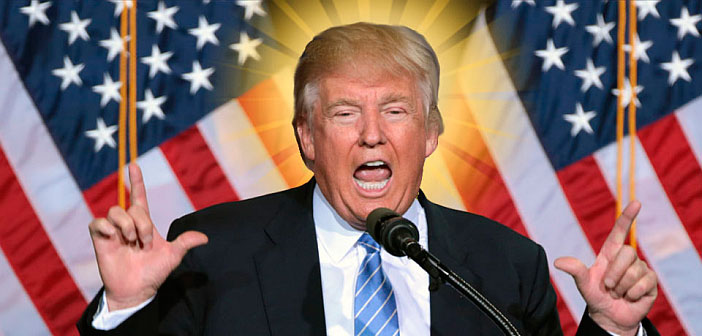Trump has become a figure worthy of respect and admiration, simply because he ordered 59 tomahawk missiles to be fired.
Source: Infernal Machine
There’s a certain kind of liberal/left commentator that – to paraphrase Robert Duvall in Apocalypse Now – just loves the sight of missiles in the morning. For some they smell like humanitarianism. For others they smell like meaningful action. Or ‘doing something’. Mostly they have the allure of American power – an aroma that is just irresistible for a certain kind of establishment pundit.For these commentators American power is always power used for righteous ends. In a world of cruelty and violence, of civil wars and state collapse and fragmentation, where ‘rogue states’ defy the will of the ‘international community’ and dictators slaughter ‘their own people’ with impunity, these pundits cry out for the world’s only military superpower to use its high-tech weaponry in the interests of universal justice and bring chaos and disorder with the kind of order only Robocop can deliver.
Trapped like flies in aspic in careers that revolve around restaurants, cafes and tv studios in the capital cities of a declining Western world that seems increasingly unable to assert its will over anything at all, their consciences cry out against the spectacle of murder – some murders anyway – being transmitted daily on television and social media platforms. They demand action. And action can only mean one thing – that America blasts the forces of evil in the name of goodness and justice.
No amount of disasters can ever diminish this yearning. When countries that were supposed to be saved by US power fall to pieces, these outcomes are either ignored, or else they intensify the intensify the hope that the next intervention will be the one the others should have been.
Without that belief in the essential goodness in American military power, it’s impossible to understand the incredible speed with which a man who less than a week ago was regarded as an ongoing calamity and a disgrace to the presidency by many of these same pundits has become a figure worthy of respect and admiration, simply because he ordered 59 tomahawk missiles to be fired at a Syrian military airfield.
Overnight Trump’s defects were swept aside by the swooshing of missiles from aircraft carriers, and his orange hair acquired something like a halo from the bright blaze of burning rocket fuel as he sat having dinner at Mar-a-lago with Melania and the Chinese president. As a result of the bombings ‘Donald Trump became president of the United States’, according to Fareed Zakaria, while MSNBC’s Brian Williams insulted Leonard Cohen by quoting from a satirical song and gushing that he was ‘guided by the beauty of our weapons’.
He wasn’t the only one. Over here Labour MPs – including many of those who had abstained from last year’s vote calling for an international investigation into alleged Saudi Arabian war crimes in Yemen – praised Trump and criticized Corbyn for condemning the strikes in Syria. And Tim Farron also praised the strikes, saying that they were a ‘proportional’ response to attacks on civilians with ‘weapons that have been outlawed by the international community for their horrific and indiscriminate consequences.’
These weapons were also outlawed when Iraq used mustard gas and sarin against Iranian soldiers and civilians, with the complicity of the same country which is now enforcing the will of the ‘international community’ – without the authorisation of the international community. And as was only to be expected, the Guardian’s Jonathan Freedland applauded the fact that ‘sometimes the right thing can be done by the wrong person’.
Freedland, as always, has his reservations about the US wars that he invariably supports. He tells us that he doesn’t ‘trust’ Trump, just as he ‘didn’t trust’ Bush and Cheney. God knows what Freedland would be like if an American war was waged by a president he did trust. On this occasion however, he can only wonder ‘if the 59 Tomahawk cruise missiles that rained down on the Shayrat base in the early hours of Friday morning were a one-off or the start of something more.’
What would that ‘something more’ consist of? All-out bombing of Syria? Ground troops? War with Russia and Iran? Freedland doesn’t say. He’s just happy that someone is doing something, even though he does acknowledge that there is ‘a legal question. Trump acted alone; he did not have UN authorisation or even try to get it. Which means he might have been breaking international law in order to enforce international law.
Some of these commentators, like Freedland, have noted the speed of Trump’s transformation, from non-interventionist president to righteous American bomber, and have attributed it to a kind of better-late-than-never humanitarianism. The New York Times described Trump’s U-turn as ‘an emotional act by a man suddenly aware that the world’s problems were now his.’
The idea that a man who refuses even to allow Syrian refugees into the US is so moved by the sight of ‘beautiful babies’ killed by chemical weapons is a pleasant fairy tale to tell to three-year-olds, but it is not the most convincing explanation for Trump’s Damascene conversion to military action. The bombings might be the work of ‘Mad Dog’ Mathis, or Trump’s plummeting domestic ratings, or the impending investigation into Russian interference with the election campaign.
Fortune magazine noted that the Syria attacks ‘lit up’ the Dow Jones stock for ‘defense’ companies, particularly Raytheon, which makes Tomahawk missiles. It’s probably only a coincidence that Trump owns shares in Raytheon, and would therefore have profited financially as well as politically from the strikes he ordered, but it’s nevertheless one worth noting.
Whatever his motivations,Trump has now discovered – like many American presidents before him – that bombing will always work in your favour no matter who you are or what the consequences may be. That does not bode well, because the consequences of what Trump has done are potentially very serious indeed: war with Syria, and also with Iran and Russia – or whoever else crosses Trump’s red lines.
All this is ok, according to Fareed Zakaria, because ‘President Trump recognized that the president of the United States does have to act to enforce international norms. For the first time really as president, he talked about international norms, international rules, about America’s role in enforcing justice in the world.’
This ‘role’ essentially consists of a carte blanche for the US to project military power anywhere in the world. Such wars invariable evoke universal principles, international laws and ‘red lines’, but in practice they are almost always used selectively, against specific states considered to be enemies of the US or obstacles to American/ Western geopolitical objectives.
The response to Trump’s bombings makes it clear that too many influential people across the political spectrum have no problem with that whatsoever, and their rapturous applause makes it likely that we will see a lot more missiles fired in the future by the one state that – regardless of the quality of its president – always has the right to fire them wherever it wants to.
Creeping Fascism: Brexit, Trump, and the Rise of the Far Right
 A tide of racism, nationalism, and authoritarianism is sweeping the world. With the world economy hobbled by debt and stagnation, society being torn apart by austerity and inequality, and a political system paralysed by corporate power, support for the Far Right is surging. This new book by Dr Neil Faulkner and Samir Dathi argues that we face the clear and present danger of ‘creeping fascism’.
A tide of racism, nationalism, and authoritarianism is sweeping the world. With the world economy hobbled by debt and stagnation, society being torn apart by austerity and inequality, and a political system paralysed by corporate power, support for the Far Right is surging. This new book by Dr Neil Faulkner and Samir Dathi argues that we face the clear and present danger of ‘creeping fascism’.

